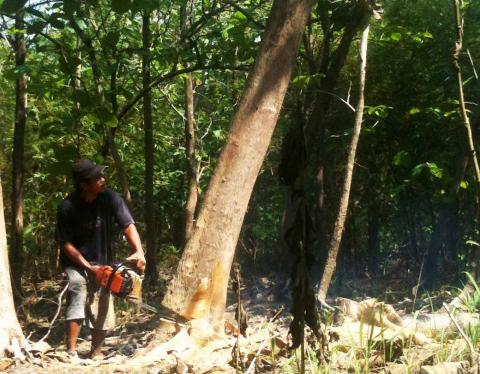Opinion: What FLEGT license means for illegal logging

This article originally appeared in the Jakarta Post.
Indonesia and proponents of sustainable forestry around the world are celebrating the first Indonesian shipments of timber under the Forest Law Enforcement, Governance and Trade (FLEGT) license on Nov. 15.
This is a milestone in the global sustainable timber trade after several major timber product recipients, such as the United States, European Union member countries and Australia, prohibited imports of illegally sourced timber products.
A FLEGT license guarantees that timber has been harvested, processed and exported in accordance with national laws. Indonesia is the first exporting country to mandate that its timber comply with certain legal requirements to be exported. The FLEGT license, thus, is a regulatory approach to suppress illegal logging.
The idea of FLEGT was established in 2003 by the EU following the Ministerial Conference in Bali in 2001 regarding Forest Law Enforcement and Governance, where participant countries declared they would collaboratively address illegal logging and associated illegal trade and corruption as well as uphold the rule of law related to those issues.
As for the implementation of FLEGT, the EU established an Action Plan to prevent illegally sourced timber from entering the EU and to promote initiatives and policies by partner countries, private companies and financial institutions to develop systems that only allow legally produced timber to enter the market.
At the same time, following the Bali Ministerial Conference, Indonesia developed the Timber Legality Assurance System (SVLK), a market-based approach to ensure that all timber entering the market, both inside and outside Indonesia, complies with the law.
That led to a Voluntary Partnership Agreement (VPA) between Indonesia and the EU in 2013 to ensure that only legally produced timber is allowed to exit Indonesia and enter the EU.
A series of actions were subsequently conducted by the Indonesian government, supported by the EU, to strengthen the SVLK by intensifying sustainable forest management as well as improving transparency and public participation within the system. On Nov. 15, the SVLK transformed into a FLEGT license, and all timber carrying the FLEGT license is hence recognized as legal timber by the EU — replacing the due diligence formerly required by the EU Timber Regulation.
Although the first FLEGT-licensed timber shipping is worth celebrating, there is still a big question mark over the effectiveness of the FLEGT licensing system in combating illegal logging.
Since the establishment of SVLK in 2009, data from the Corruption Eradication Commission (KPK) show that the loss of timber from Indonesia’s natural forest declined between 2009 and 2011 (49-61 million m3 in 2009 to 28-39 million m3 in 2011).
However, the loss jumped significantly to around 47-60 million m3 in 2012, and the figure kept rising in 2013 and 2014. These figures imply that the impact of the SVLK on combating illegal logging in Indonesia remains unclear.
Indeed, the SVLK alone cannot be perceived as a sole solution to the timber loss. The KPK has identified several weaknesses of the timber administration system in Indonesia causing the high rate of timber loss, including a lack of planning and data, an unreliable monitoring system and poor law enforcement.
Besides, the National REDD+ Strategy ( 2012 ) suggests that poor law enforcement, corruption and mismanagement of land tenure have been the drivers of deforestation, including deforestation driven by illegal activities.
This shows that the SVLK should be integrated with other efforts to successfully combat illegal logging. And this is where the SVLK, which has now transformed into FLEGT, can play an integral part.
A policy that incorporates SVLK licensing in an integrated strategy would further strengthen the impact of the license in fighting illegal logging. Unfortunately, the SVLK is rarely placed in such a strategy.
In the 2015-2019 strategic plan of the Environment and Forestry Ministry, the SVLK is not included in the strategy to combat illegal logging, although it is included in the strategy to improve forestry investment and boost certified-timber exports.
In the National REDD strategy, however, the SVLK is included as part of the efforts to combat illegal logging, although the extent to which the strategy is referred to by the ministry and relevant agencies remains hazy. This disintegration of the SVLK undermines the eradication of illegal logging in Indonesia.
Devising a national strategy against illegal logging that includes the FLEGT license is critical.
The FLEGT license can provide data on certified timber by which monitoring and law enforcement agencies can easily trace timber to its logging source.
The development of this traceability system requires support from various agencies, especially those who administer logging licenses and timber production. The law enforcement agencies could strengthen the FLEGT license by monitoring the license and following-up any irregularities suspected in the license, including those reported by independent monitoring. Such collaboration will strengthen the legality assurance of the FLEGT license, which is the key to its contribution to the eradication of illegal logging.
Consequently, the FLEGT license system should have clear indicators to combat illegal logging and collaborate with other government agencies to fight crime. The FLEGT license policy should go beyond the issuance of licenses and certification of export products. Let’s hope that several years after the first shipment of FLEGT-licensed timber, Indonesia will celebrate a significant reduction in illegal logging.